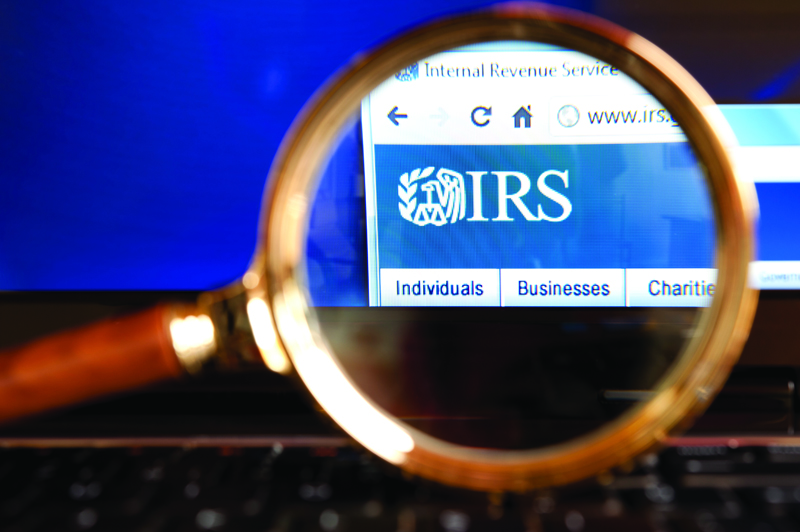Proposal would hurt community banks, has privacy issues
By Jack Criss
A recent IRS data collection proposal to increase tax information reporting requirements on financial institutions would trade American privacy for government revenue–and impose huge, costly burdens on smaller banks.
The idea originated in the House of Representatives as part of the “human infrastructure bill” endorsed by the Biden Administration and is being endorsed by Democratic Senators like Elizabeth Warren and Bernie Sanders. The rationale is to close “tax gaps” through increased IRS funding. Currently, the proposal is part of a White House/Treasure push and is not yet legislative language–however, it could rapidly become just that: a new law and regulation.
Mississippi Congressman Michael Guest (MS-03) joined Congressman Tom Emmer of Minnesota and other Republican Members of Congress in a letter to Speaker Nancy Pelosi, Ways and Means Chair Representative Richard Neal, Department of Treasury Secretary Janet Yellen, and IRS Commissioner Charles P. Rettig to express concern about the data collection proposal to require financial institutions and other financial services providers to report certain transaction level data as well as information about the outflows and inflows on all accounts over $600 to the IRS every year.
The requirements of this proposal would impose significant compliance costs on banks, credit unions, and related financial institutions, but also infringe on the privacy of millions of Americans with bank accounts, credit cards and even PayPal and crypto-currency accounts, i.e., any financial transaction.
In a press release, Guest stated, “This proposal is simply grasping at straws in an attempt to provide cover for the huge spending proposals Congressional Democrats are pursuing. There is no evidence that the IRS data collection proposal is effective at closing the ‘tax gap’—the difference between taxes paid and taxes owed by law. Furthermore, the proposal would sacrifice American privacy for the sake of government revenue, an ineffective and Orwellian strategy of offsetting government spending, especially when other methods remain available,” Guest said. “Following the invaluable service our financial institutions provided to keep our nation afloat during the pandemic, this proposal to help fund a multi-trillion-dollar spending proposal at the cost of Americans’ privacy is a downright betrayal of our financial institutions and the American people and should not be implemented.”
Local Delta bankers and the Mississippi Bankers Association have also voiced concerns over what they see as massive and ominous overreach.
In a letter sent to members of the Mississippi Congressional Delegation, MBA President and CEO, Gordon Fellows said the following: “The Mississippi Bankers Association represents every commercial and savings bank with a significant deposit market share in Mississippi. On behalf of these members and the communities they serve, I write to express our strong opposition to a proposal under consideration as part of the reconciliation package that would create new tax information reporting requirements for financial institutions. We urge members of the Mississippi delegation to oppose any efforts to advance this significant new reporting regime.

“We also requested that new financial institution tax reporting requirements be excluded from the reconciliation package,” says Fellows. The requirements are far more expansive and vastly more complicated than the few sentences of description suggest, would generate a new trove of data that the IRS is unlikely to be able to use or protect, and would impact the privacy of nearly every Mississippian that has a bank account. This proposal, as we understand it, would require financial institutions and other providers of financial services to track and submit to the IRS information on the inflows and outflows of every account above a de minimis threshold of $600 during the year—or any account that has $25 worth of activity each month,” continues Fellows.
“This proposal would create a dragnet, collecting the financial information of nearly every American and requiring significant resources to build, police, and maintain,” says Fellows. Policymakers must consider how account-holder data would be protected and whether a program of this scale and scope infringes on the American people’s reasonable expectation of privacy. The IRS experiences 1.4 billion cyberattacks annually, has had multiple data breaches, and continues to deal with the fallout of identity theft and false tax returns. Adding an entirely new, broad set of data will likely compound the IRS’s systemic problem and expose even more taxpayer data to cyber risk.”
Despite assertions that this proposal would be simple to execute and represent a low or even no cost mechanism to help narrow the tax gap, designing system capabilities to capture account inflows and outflows and other information is complex, expensive, and will take years. The potential added costs of complying with such a broad proposal could seriously strain the resources of some of our state’s smallest community banks, which could in turn seriously harm those banks’ ability to serve their communities.
Fellows noted that in a recent Morning Consult poll 67 percent of Americans expressed opposition to this proposal in its current form.
“Bankers around the state have reported an increasing number of customer complaints with this proposal,” he says. We believe that as more Mississippians begin to understand this proposal bankers will continue to hear increased customer objections about it. The MBA acts as a representative of the more than 20,000 thousand bank employees in Mississippi and all the customers and communities these bankers serve and urge our lawmakers to oppose efforts to implement this new, reporting policy.”
“We are also concerned about the rise of unbanked individuals this legislation would no doubt exacerbate,” said Amanda Markow, Communications Manager for the MBA, “and who will then turn to check cashing businesses, non-bank lenders and the like thus adding to an already existing problem.”
Danny Whalen, President of Cleveland State Bank, actually sounded the alarm about this proposal on the bank’s Facebook page with an announcement.
“The American public needs to be aware of this, no doubt,” wrote Whalen. “With all banking accounts being reported to and reviewed by the IRS and the requirement of community banks like ours having to shoulder the added costs this necessitates–it would create a huge compliance burden to us and other banks our size and there exists no option for either banks or customers to opt out.”

Phil Williams, CEO and President of Bank of Yazoo based in Yazoo City, has been a vocal opponent of the proposal and says that the cost to consumers and banks would go up exponentially.
“The reprograming and training involved would have to be passed on to the consumers,” notes Williams. “To me, it’s also a huge surveillance dragnet. Any asset or deposit made, or transfer, would have burdens of proof attached to them–any and all financial information made through a bank would be reported. This, in turn, would also require more IRS agents to enforce these new regulations. Sadly, most people aren’t aware of what’s happening and we’re doing all we can to educate our customers to take steps to oppose this.”

Bank of Anguilla CEO and President and current Chairman of the Mississippi Bankers Association in his second term (among many other national banking boards), Andy Anderson, has long been an advocate for community banks and is very concerned about what is being proposed.
“Mississippi Delta bankers are community bankers in the truest sense of the word,” says Anderson, “and it’s a mission for all of us. We are here to help people in making loans and assisting our neighbors in every way we can. These types of new regulations, like this $600 idea coming down the pike, will only hurt both the banks and their customers. I don’t think those in regulatory power and in the government realize just what this proposal could do to us in the community banking realm. It goes against every grain of common and economic sense.”

Former Ole Miss Economics professor and current Research Director and Senior Fellow of The Independent Institute, a prominent free-market think tank–Dr. William Shughart–notes similarities between the new proposal and The Patriot Act passed in the wake of 9/11.
“I wrote a paper with a colleague after conducting extensive research on the effect of The Patriot Act on the nation’s financial system,” says Shughart, “and we found that thousands of community banks either went out of business or had to merge with larger institutions becauses of the added costs of compliance with the new regulations. I see the same scenario taking place here if this proposal becomes law.”
The possible implementation of this regulation into legislative language is very real, experts warn, and could come much sooner than anyone expects–possibly even by the end of October. However, there exists a rising pushback among those in the banking industry, certain lawmakers and the general public. Whether this pushback will be enough to stop it remains to be seen.

